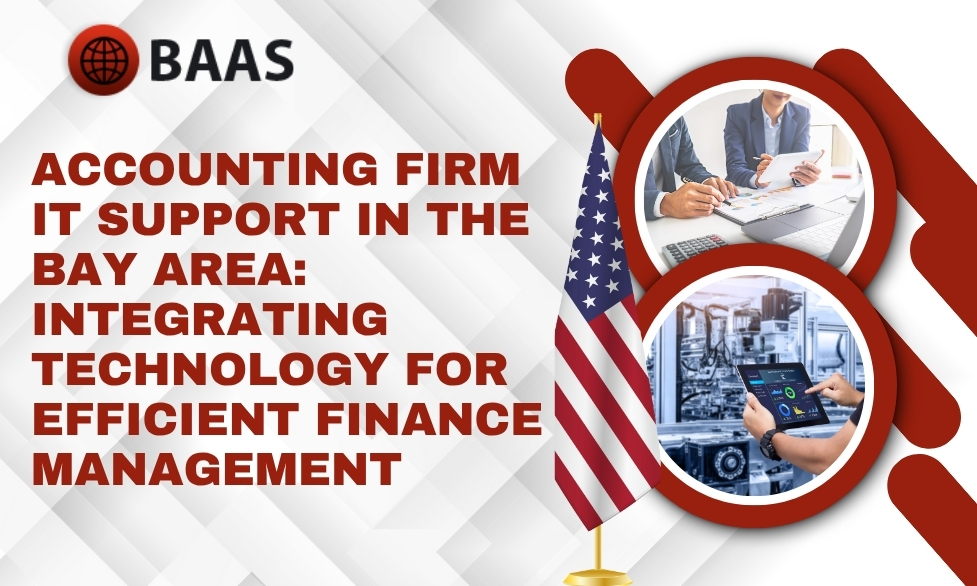Accounting Firm IT Support in the Bay Area: Integrating Technology for Efficient Finance Management
Accounting Firm IT Support is becoming increasingly crucial as the accounting industry continues to rely heavily on technology. From cloud-based bookkeeping platforms to secure document exchange and automated payroll tools, modern firms depend on reliable IT systems to work efficiently and securely.
For accounting firms in the Bay Area, where both competition and client expectations are high, having strong Accounting Firm IT Support is not just helpful — it’s essential. With the right technology in place, firms can improve workflow, enhance financial accuracy, protect sensitive data, and deliver faster, more strategic services to clients.
This guide outlines why Accounting Firm IT Support matters and what firms should prioritize to build a secure, efficient, and scalable digital environment.
Why IT Support Matters for Accounting Firms
Accounting firms handle sensitive financial data, real-time reporting, regulatory filings, and client communications. Technology plays a critical role in enabling:
- Secure data storage and cloud backups
- Efficient collaboration between team members and clients
- Automation of repetitive accounting tasks
- Faster, more accurate financial reporting
- Compliance with IRS, state, and industry data regulations
With the right IT infrastructure, firms reduce risk, improve productivity, and deliver better results for their clients.
Key IT Needs for Accounting Firms
Here are the core areas where accounting firms should focus their IT strategy:
1. Secure Cloud-Based Accounting Software
Modern firms use cloud accounting platforms for efficiency and real-time collaboration.
Popular systems include:
- QuickBooks Online
- Xero
- Sage Intacct
- NetSuite
Benefits:
- Access financial data anytime, anywhere
- Reduce on-premise server costs
- Enable better team and client collaboration
Pro Tip: Ensure multi-factor authentication (MFA) is enabled to protect cloud access.
2. Data Security & Compliance
Accounting firms handle confidential personal and business financial information — making cybersecurity a non-negotiable priority.
Essential protections include:
- Data encryption
- Secure client portals
- Firewall and antivirus systems
- Regular security audits
- Role-based access controls
Pro Tip: Implement SOC and GDPR-aligned compliance practices to meet regulatory standards.
3. Automated Workflow & Practice Management Tools
Automation streamlines repetitive tasks like:
- Data entry
- Billing and invoicing
- Payroll processing
- Recurring journal entries
Useful tools include:
- Tax preparation software (e.g., Lacerte, Drake, Pro Series)
- Document management systems
- Automated time-tracking and billing platforms
Pro Tip: Integrate applications so data flows seamlessly across systems.
4. Reliable Data Backup & Recovery Systems
Accounting firms cannot risk losing data from:
- Server crashes
- Cyberattacks
- Hardware failure
- Natural disasters
Monthly — and ideally daily — cloud backups protect business continuity.
Pro Tip: Use automated backup solutions with off-site redundancy.
5. Client Communication & Collaboration Tools
Smooth communication helps deliver faster and more organized financial services.
Recommended tools:
- Secure document-sharing portals
- Encrypted email systems
- E-signature tools (DocuSign, Adobe Sign)
- Client CRM platforms
Pro Tip: Avoid sending sensitive documents via standard email — use encrypted portals instead.
Common Technology Challenges Accounting Firms Face
Avoid these common pitfalls:
- Relying on outdated or unsupported software
- Lack of multi-layered cybersecurity protection
- Manual data entry slowing down workflows
- Disorganized document storage
- Not training staff on new tools
Benefits of Professional IT Support for Accounting Firms
Partnering with a specialized IT team helps firms:
- Implement secure, scalable cloud systems
- Maintain compliance with industry data regulations
- Reduce downtime and improve efficiency
- Automate accounting workflows
- Receive ongoing tech support when issues arise
Pro Tip: Look for IT providers experienced in servicing accounting and financial businesses — not just general IT companies.
Staying Competitive with Smart Technology
When accounting firms embrace technology strategically, they gain:
- Faster turnaround times
- Higher data accuracy
- Stronger client trust
- More capacity to scale and serve more clients
Technology isn’t just a support tool — it’s a competitive advantage.
Final Thoughts
Integrating the right technology is key to running a secure, efficient, and modern accounting firm, especially in the tech-forward Bay Area market. With strong IT support, firms can streamline operations, improve client experience, and position themselves for long-term success.
Need IT support designed specifically for accounting firms?
We help Bay Area firms implement secure cloud systems, automate workflows, and stay fully compliant — so you can focus on client service and growth.
FAQ: IT Support for Accounting Firms
Q1: Do accounting firms really need cloud-based accounting software?
Yes. Cloud software improves collaboration, ensures real-time financial updates, and reduces the need for physical servers. It also makes remote work easier and more secure.
Q2: What is the biggest cybersecurity risk accounting firms face?
Phishing attacks and unauthorized access to client data are major risks. Using multi-factor authentication (MFA), data encryption, and secure passwords helps prevent breaches.
Q3: Should an accounting firm outsource IT support or hire in-house?
Many firms choose to outsource because it’s more cost-effective and provides access to expert-level IT professionals without needing a full-time internal team.
Q4: How often should accounting firms back up financial data?
Daily automated cloud backups are recommended to ensure data can be recovered in case of system failure or cyber incidents.
Q5: What’s the safest way to send financial documents to clients?
Use secure client portals or encrypted file-sharing systems instead of regular email. This protects private financial information from unauthorized access.



